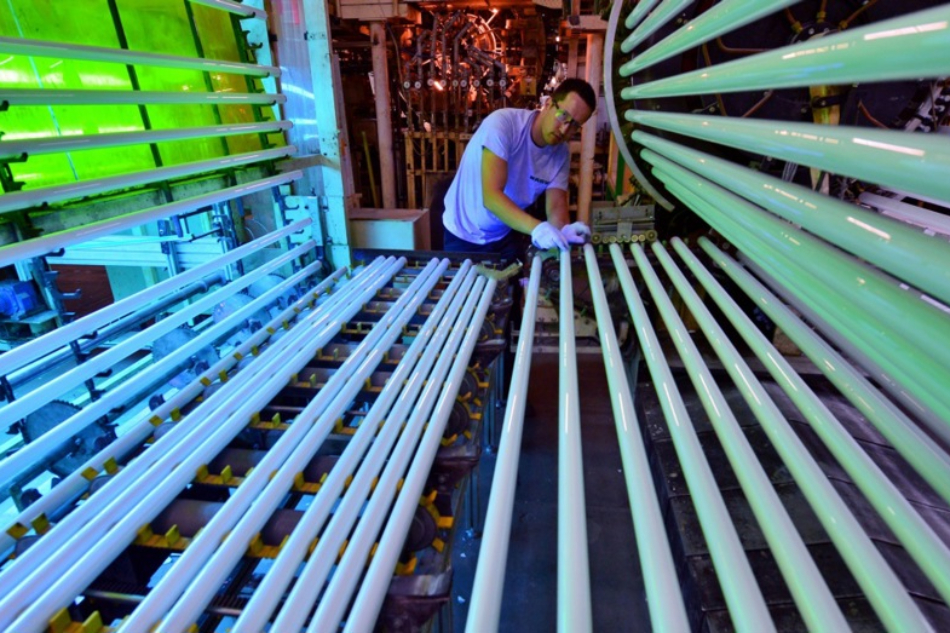Anti-mercury pollution treaty eyes ban on fluorescent tubes by 2027 | ABS-CBN
ADVERTISEMENT

Welcome, Kapamilya! We use cookies to improve your browsing experience. Continuing to use this site means you agree to our use of cookies. Tell me more!
Anti-mercury pollution treaty eyes ban on fluorescent tubes by 2027
Anti-mercury pollution treaty eyes ban on fluorescent tubes by 2027
ABS-CBN News
Published Nov 04, 2023 04:32 PM PHT
The members of an international convention against mercury pollution agreed Friday to ban the production and trade of fluorescent tubes by 2027, citing the human health risks posed by the equipment's use of the substance.
The members of an international convention against mercury pollution agreed Friday to ban the production and trade of fluorescent tubes by 2027, citing the human health risks posed by the equipment's use of the substance.
As the Minamata Convention on Mercury already prohibits the production, export and import of fluorescent bulbs, the manufacturing of all types of the product for general purposes will be suspended within four years.
As the Minamata Convention on Mercury already prohibits the production, export and import of fluorescent bulbs, the manufacturing of all types of the product for general purposes will be suspended within four years.
Fluorescent lamps currently in use and those in stock can be used beyond the deadline.
Fluorescent lamps currently in use and those in stock can be used beyond the deadline.
The parties of the convention failed to reach agreement, however, on the handling of dental amalgams during their five-day meeting from Monday in Geneva, and will proceed with consultations toward their next meeting in 2025.
The parties of the convention failed to reach agreement, however, on the handling of dental amalgams during their five-day meeting from Monday in Geneva, and will proceed with consultations toward their next meeting in 2025.
ADVERTISEMENT
"It has been a tremendous, productive week for this convention -- we can be excited by what we have achieved," Claudia-Sorina Dumitru, president of the fifth conference of the treaty's parties, said in her closing remarks.
"It has been a tremendous, productive week for this convention -- we can be excited by what we have achieved," Claudia-Sorina Dumitru, president of the fifth conference of the treaty's parties, said in her closing remarks.
The environmental organization Clean Lighting Coalition estimated that Friday's agreement regarding the production and trade of fluorescent lamps will help reduce carbon emissions by 2.7 gigatons, save $1.13 billion on electric bills and reduce the use of mercury by 157 tons between 2026 and 2050.
The environmental organization Clean Lighting Coalition estimated that Friday's agreement regarding the production and trade of fluorescent lamps will help reduce carbon emissions by 2.7 gigatons, save $1.13 billion on electric bills and reduce the use of mercury by 157 tons between 2026 and 2050.
Exposure to high amounts of mercury can lead to long-term and sometimes permanent health impacts.
Exposure to high amounts of mercury can lead to long-term and sometimes permanent health impacts.
In the late 1950s, many residents of the seaside city of Minamata, southwestern Japan, suffered a neurological disorder caused by mercury poisoning after eating fish contaminated with the substance discharged from a nearby chemical plant.
In the late 1950s, many residents of the seaside city of Minamata, southwestern Japan, suffered a neurological disorder caused by mercury poisoning after eating fish contaminated with the substance discharged from a nearby chemical plant.
The convention, which has a total of 147 countries and regions as members, was adopted at an international conference in the city of Kumamoto in October 2013 and took effect in August 2017.
The convention, which has a total of 147 countries and regions as members, was adopted at an international conference in the city of Kumamoto in October 2013 and took effect in August 2017.
ADVERTISEMENT
ADVERTISEMENT



